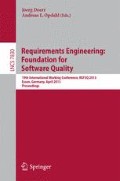Abstract
[Context and motivation] For the requirements engineering (RE) community it is clear that requirements engineering is a specific activity and role within software development. [Question/problem] However: What about practice? Is RE seen there as a separate role? What qualifications do practitioners see as critical for this task? [Principal ideas/results] 141 job advertisements from 2009 and 67 from 2012 were analysed statistically in order to find out how practice perceives and staffs RE: Which official job title do those persons have who do RE? Which further responsibilities do these persons have? Which qualifications are demanded? [Contribution] The study´s main results are: The position “requirements engineer” hardly exists. RE instead is done by consultants, software engineers, architects, developers and project managers, who additionally have an average of 3 further tasks. RE is no task for job beginners: 73% of the job advertisements wish or demand previous job experience. Further important qualifications are: 94% soft skills (the Top 3 soft skills are: capacity for teamwork, English language and communication skills), 76% demand knowledge with respect to the technology used, while only 34% mention RE knowledge. RE is most often combined with solution design (77% respectively 61%).
Access this chapter
Tax calculation will be finalised at checkout
Purchases are for personal use only
Preview
Unable to display preview. Download preview PDF.
References
Abran, A., Moore, J.W.: SWEBOK: Guide to the Software Engineering Body of Knowledge. IEEE Computer Society, Los Alamitos (2004)
Alenljung, B., Persson, A.: Factors that Affect Requirements Engineers in their Decision Situations: A Case Study. In: REFSQ Workshop 2005, pp. 25–39 (2005)
Alexander, I., Robertson, S., Maiden, N.: What Influences the Requirements Process in Industry? – A Report on Industrial Practice. In: Proceedings of 13th International Requirements Engineering Conference, pp. 411–415 (2005)
Aurum, A., Wohlin, C.: Requirements engineering: setting the context. In: Aurum, A., Wohlin, C. (eds.) Engineering and Managing Software Requirements, 1st edn., p. 478. Springer, Berlin
Berry, D.M.: The Importance of Ignorance in Requirements Engineering. Journal of Systems and Software 28(1), 179–184 (1995)
Curtis, B., Krasner, H., Iscoe, N.: A field study of the software design process for large systems. Communications of the ACM 31, 1268–1287 (1988)
Jantunen, S.: The Benefit of Being Small: Exploring Market-Driven Requirements Engineering Practices in Five Organizations. In: 1st Workshop RE in Small Companies (RESC), 29th June 2010 at the REFSQ 2010 Conference in Essen (2010)
Klendauer, R., Berkovich, M., Gelvin, R., Leimeister, J.M., Krcmar, H.: Towards a competency model for requirements analysts. Information Systems Journal 22(6), 475–503 (2012)
Neill, C.J., Laplante, P.A.: Requirements Engineering: State of the Practice. IEEE Software 20(6), 40–45 (2003)
Nikula, U., Sajaniemi, J., Kalviainen, H.: Management view on current requirements engineering practices in small and medium enterprises. In: Proc. Australian Workshop on Requirements Engineering (2000)
PMI: A Guide to the Project Management Body of Knowledge - 3rd edn. PMI (2004)
Prikladnicki, R., Audy, J.L.N., Evaristo, R.: An Empirical Study on Global Software Development: Offshore Insourcing of IT Projects. In: Proceedings of the International Workshop on Global Software Development, International Conference on Software Engineering (ICSE 2004), pp. 53–58. IEEE, Edinburgh (2004)
Sommerville, I., Kotonya, G.: Requirements Engineering: Processes and Techniques. Wiley & Sons, Chichester (1998)
Strauss, A.L., Corbin, J.M.: Basics of qualitative research grounded theory procedures and techniques, vol. 6. Sage, Newbury Park (1991)
Weißbach, R.: Bridging the Communication Gap in Information System Projects – Enabling Non-IT Professionals for the Requirements Engineering Process. In: CARPE Networking Conference (2011), http://julkaisut.turkuamk.fi/isbn9789522162519.pdf
Zowghi, D., Damian, D., Offen, R.: Field Studies of Requirements Engineering in a Multi-Site Software Development Organization. In: Proc. Australian Workshop on Requirements Engineering. Univ. of New South Wales (2001)
Author information
Authors and Affiliations
Editor information
Editors and Affiliations
Rights and permissions
Copyright information
© 2013 Springer-Verlag Berlin Heidelberg
About this paper
Cite this paper
Herrmann, A. (2013). Requirements Engineering in Practice: There Is No Requirements Engineer Position. In: Doerr, J., Opdahl, A.L. (eds) Requirements Engineering: Foundation for Software Quality. REFSQ 2013. Lecture Notes in Computer Science, vol 7830. Springer, Berlin, Heidelberg. https://doi.org/10.1007/978-3-642-37422-7_25
Download citation
DOI: https://doi.org/10.1007/978-3-642-37422-7_25
Publisher Name: Springer, Berlin, Heidelberg
Print ISBN: 978-3-642-37421-0
Online ISBN: 978-3-642-37422-7
eBook Packages: Computer ScienceComputer Science (R0)

